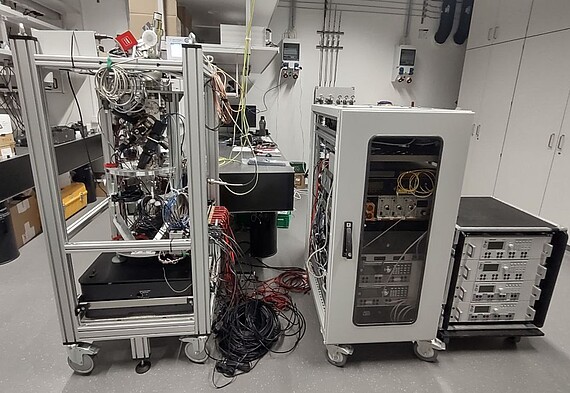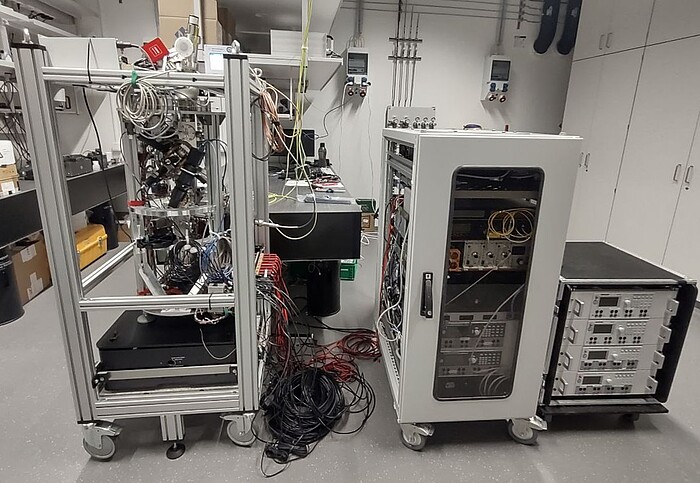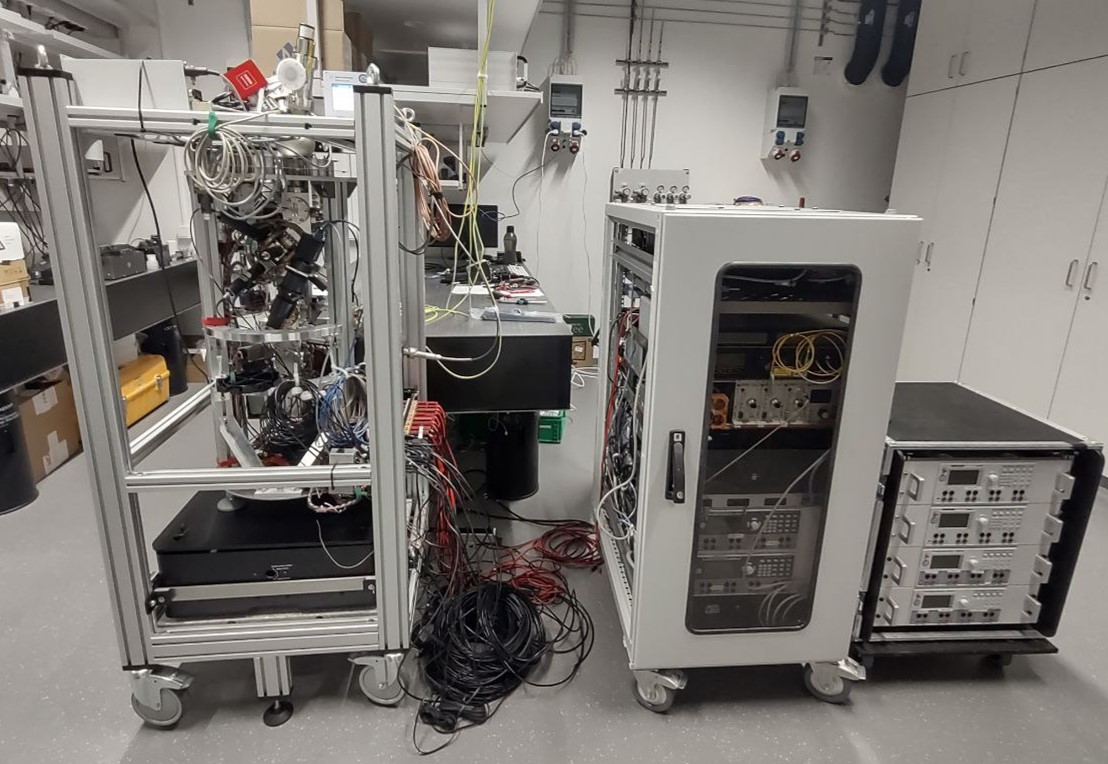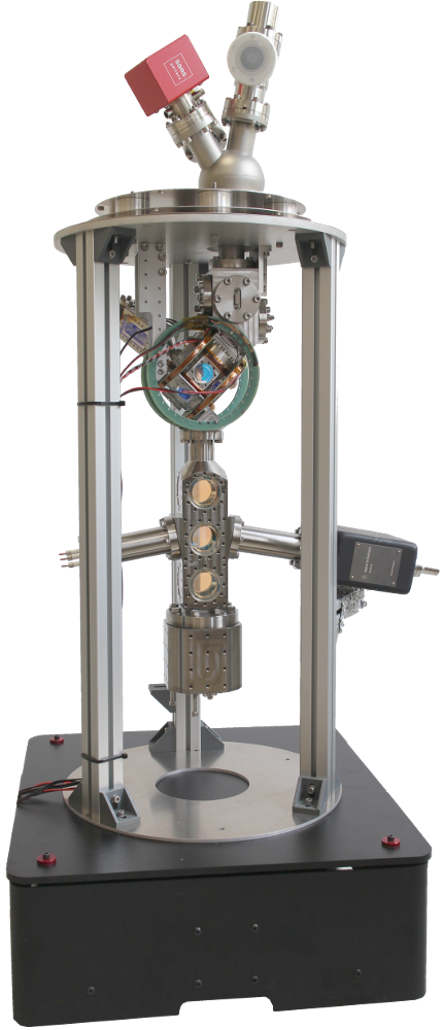Introduction
The first demonstration of an atom-chip gravimeter marks a paradigm shift in measuring gravity. Thanks to using Bose-Einstein Condensates (BECs) as probes, our evaluations predict an unprecedented accuracy level reachable with our next generation devices. Gravimeters based on interferometry with cold atoms have demonstrated quasi continuous monitoring with an uncertainty of 32 nm/s2 – mainly being limited by the expansion rate of the atomic ensemble in use. Worldwide, efforts focus on overcoming this limitation for cold atom gravimeters.
Our novel gravimeter will explore the superior mode quality of BECs and the advanced control features provided by atom chips to lower the dominant uncertainties in current atomic gravimeters stemming from the Coriolis force and wavefront aberrations. Improving on these two major uncertainties, our devices will reach one order of magnitude beyond the current uncertainties of competing devices. With this performance, we will be able to venture deep into the physics of beam splitters and verify current theoretical predictions on the intrinsic uncertainties. Up to now, no effect has been identified, hindering even lower uncertainties.
Moreover, it is planned to deploy a next generation gravimeter to the Institut für Erdmessung, Leibniz Universität Hannover (IfE) reference station Clausthal in the Harz Mountains or to the gravimetry laboratory in Ruthe. It will demonstrate its transportability and its capabilities in environments relevant for geodesy. A campaign project Groundwater gravimetry for surveying the gravity variations due to groundwater changes in an area overlapping with the pilot area GE-2 of the TOPSOIL project is anticipated. This research aims to understand the salt water dynamics in a coastal region, which is important for future availability of fresh groundwater. The demand for earth simulators with advanced predictive power is paired with better methods for earth observation.
With these demonstrations our novel device has the potential to open up inaccessible windows in geodesy, leading to new insights, e.g. into earth mass transport mechanisms like ground water flow, ice melting, or land uplift. These insights will help in refining the earth’s mass model and the underlying theory of the mass redistribution of our planet.
Research Goals
- Explore Gravimetry with unprecedented accuracy
- Advance atom interferometry with Bose-Einstein condensates



Recent Status
After having demonstrated first gravimetry measurements, our Quantum Gravimeter is now transportable and moved from the IQ at Welfenschloss to the Hannover Institute of Technology - HITec. Here, final characterisations and optimisations of the device will be carried out and a new in-lab measurement campaign started. This will mark the starting point for campaigns outside of a cosy laboratory environment - a new challange.
Open positions
Working with atoms demands a stable polarisation and power of the light applied to the atoms. Up to now, this is realised by the use of polarisation maintaining fibres, which shows imperfections. Therefore, we want to develop and test beam shaping optics, like collimators, which include polarisation filters and give the possibility for power stabilisation.
If you are interested, please contact Dr. Waldemar Herr (herr@iqo.uni-hannover.de).
In order to fully understand the observations obtained in the experimental apparatus and engineer new experimental sequences a theoretical model of the magnetic trap fields gauged to the apparatus is neccesarry. In the frame of this Bachelor thesis the existing model will be adapted towards the real experimental parameters by aquiring data and comparing it to the simulation.
If you are interested, please contact Dr. Waldemar Herr (herr@iqo.uni-hannover.de).
After having moved our Quantum Gravimeter to HiTec, interferometry with Bose-Einstein Condansates to measure the local gravitational acceleration will be performed. New methods and the physics of BEC interferometry need to be investigated.
If you are interested, please contact Dr. Waldemar Herr (herr@iqo.uni-hannover.de).
Similar as lasers in optics, Bose-Einstein condensates (BEC) are very promising for atom interferometry. Important methods for BEC interferometry have been developed in our group, promising a uniquely high accuracy for acceleration measurements. In particular, we succeeded in developing a transportable quantum gravimeter for measuring Earth’s gravity. As part of the scientific activities, measurement campaigns will be carried out in cooperation with the Institute of Geodesy at Leibniz University Hannover at geodetically relevant locations. New methods and the physics of BEC interferometry will be investigated, e.g. the impact of atomic collisions and of blackbody radiation on the atomic interferences.
The official tender can be found here.
If you are interested, please contact Dr. Waldemar Herr (herr@iqo.uni-hannover.de).
Coordinators
30167 Hannover
Co-Workers
Institut für Quantenoptik
30167 Hannover



